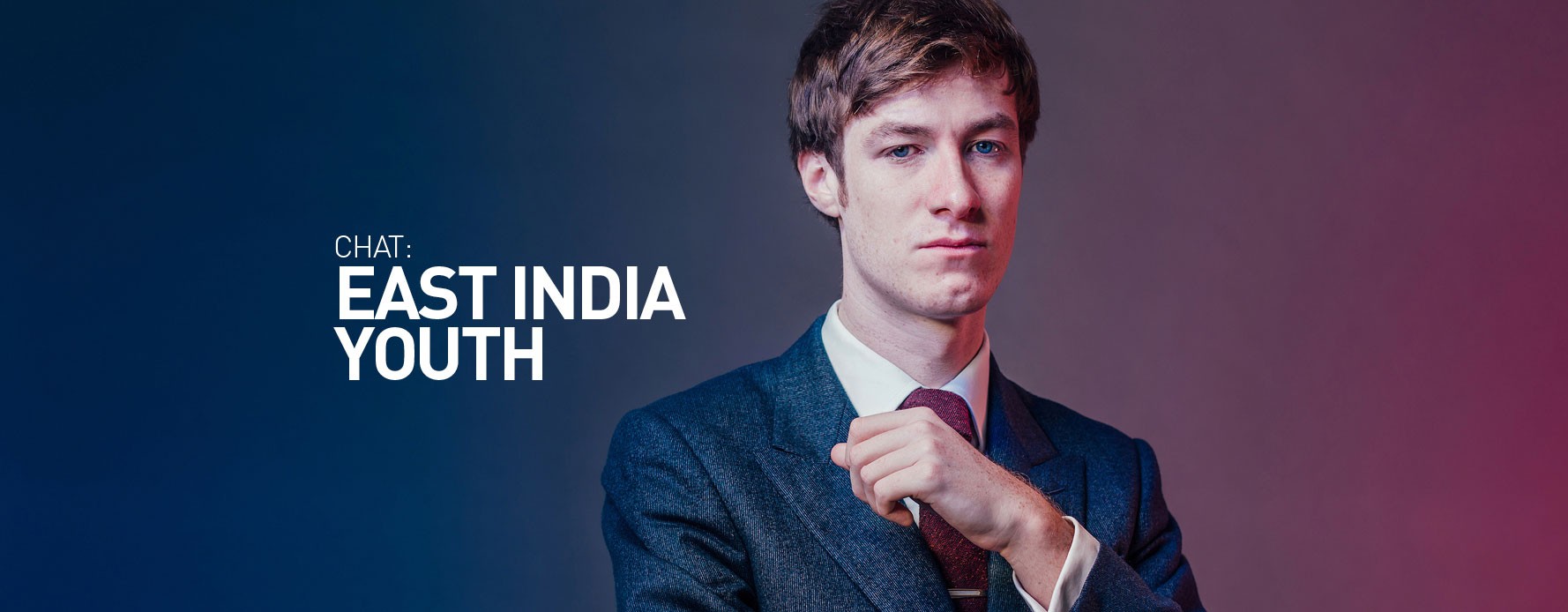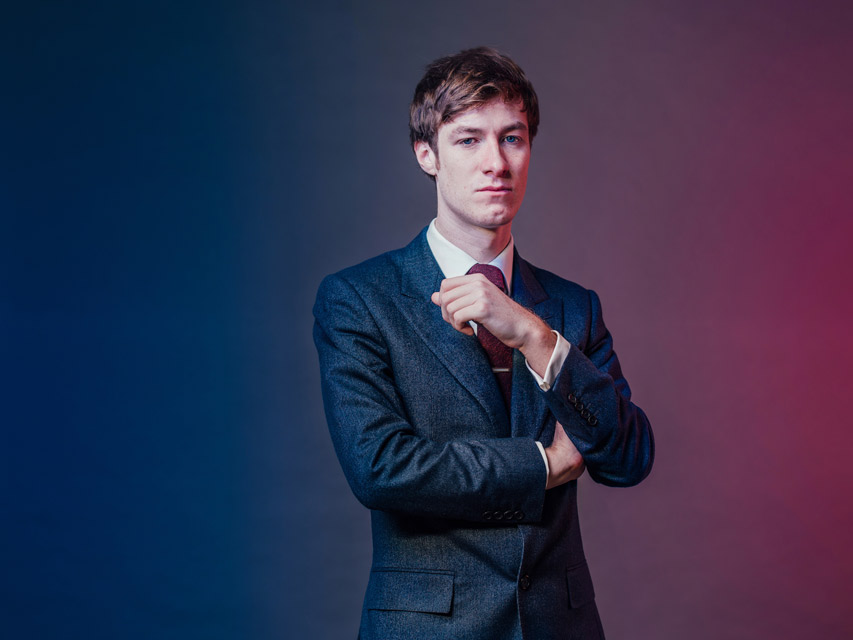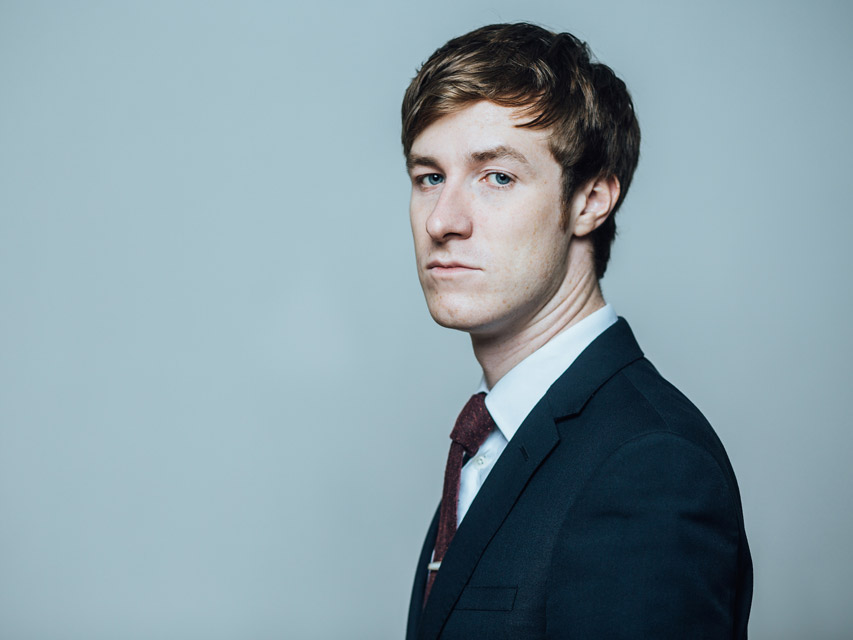The Idea of a ‘Pop Star’ With East India Youth
 Thirsty for JUICE content? Quench your cravings on our Instagram, TikTok and WhatsApp
Thirsty for JUICE content? Quench your cravings on our Instagram, TikTok and WhatsApp

The dapperly suited man behind East India Youth (né William Doyle) was lauded a Mercury Prize nomination for his debut album Total Strife Forever and the privilege of calling Brian Eno a fan. Although he did not win the award, he continued that effort with Culture of Volume – an album that displays his singing ability amidst his leftfield, avant pop soundscape. JUICE spoke to Doyle about being a ‘pop star’ as an idea, the importance of track arrangement, venturing outside one’s comfort zone, as well as an insight into his “conceptual” third album.
What was it like to be able to vocalise the lyrics that you’ve written through singing rather than just relying on instruments?
Well, I was playing live a lot during the first album. My voice was just getting better, I was getting more confident with my singing. When I released the second album [Culture of Volume], I wanted to use that strength in my voice. A lot of the songs that I was writing were written with the view of singing it live, but I had different things that I wanted to express as well. The first album [Total Strife Forever], I was able to express certain emotions and ideas with just instruments, but this album felt more like a conversation with the audience, I think, that’s why I’m singing more on Culture of Volume.
You’ve mentioned that you wanted to make a pop record with Culture of Volume, but you had to convince yourself of the idea of being a pop star. So, are you happy with the outcome of the album?
Well, I’m not a huge pop star, so I’m very disappointed I haven’t topped the charts, actually. I don’t know what went wrong… No, it was an interesting experiment because it’s very hard to make good pop music. I try to be in the zone of being a pop star or whatever, I’m happy with the way it turned out, but I don’t know if there’s much interest left in working in that way for me. It’s been a fun, interesting ride, but it’s a lot of hard work being that sort of way! You’d think it’s one of the easiest parts of being a musician, but it’s really very hard to write, perform, and present yourself in that pop context.
The most compelling track on the album, ‘Carousel’, comes right after these two heavy club tracks, did you take your time to rummage over the track sequence of the whole album in order to make the flow perfect?
Yes! Definitely. I love doing that; it’s one of the more exciting parts of doing what I do. I’m a big fan of the album format anyway, you start to think about how the song before one and the song after one have an effect on a particular song, and that’s the same for every track. You start to listen from start to finish, like, how would it feel? You know, for this album, putting a large techno track before ‘Carousel’, it gives ‘Carousel’ a bigger, emotional impact to the person who’s listening from start to finish. I like the extremes on the record, I like it when other people do that on records I love. Yeah, that’s one of the really fun bits. You finish the actual song itself and now you can think of it in a wider sense and its relationship with the other songs, other sounds. It’s really cool to see it coming out there working by itself.

How was it fluctuating between dancier, industrial techno tracks to the more meditative and sombre songs on the album?
There are a lot of aspects of music that I’m interested in and trying to convey it all at once. Sometimes, it’s quite difficult. You have to be in one headspace to create something and be in different frame of mind to do something else. Maybe that’s why it takes me quite a while to make albums in the end – there’s a period of my life where I’m just listening to dance music and techno and its whole influence on my music. And there are more sombre periods where [I’m] listening to more traditional singer-songwriters and more ambient music or something, but that’s it. One of the most exciting parts is putting them all together.
You’ve been making music in your bedroom for almost 10 years, is the music-making process a very singular experience for you?
Yeah, I feel very comfortable working like that, maybe that’s a bad thing or it’ll end up being a bad thing. It’s interesting, you kinda feel cocooned [when you’re working alone], you shut the door and there’s no one to tell you to get out. There’s no clock hanging over your head, and there’s no need to think about time and money, so it’s more relaxed. I’m a really obsessive person, I get really obsessed with living in the world of the album, so being at home really helps a lot. But, I don’t think I’ll be doing that for much longer, otherwise I’ll just be making the same albums over and over again (laughs). It’ll get boring for me and the people listening.
It’s probably time for you to bounce ideas off of people, step away from your project a bit and get a different perspective…
Yeah! I’ve been resistant to that for too long now, I think. It’s the same thing; you get too comfortable with the space that you’ve created for yourself. You come across more interesting ideas even if you’ve talked through it with someone else; you’d get a fresh perspective on your art and other people’s work and how it influences what you’re doing. I’m probably not gonna make it into a band or anything like that, I don’t really want to enter that sort of weird, democratic way of making things again, but definitely more of a conversation with artists from many fields of work, not just music. I think it would make me a better person and a better artist from learning from other people. Yeah, I really wanna start doing that – next year I think – that would be my main goal.
We’ve read somewhere that your next project would be more conceptual, is that correct? Would you care to elaborate on that?
(Laughs) I’ve got to be more careful with what I say to people, shouldn’t I? Yeah, it is, it is. It’s a thing that I’ve been thinking for a few years now, probably just before Total Strife Forever. I’ve had an idea for a space in which an album or project could be developed in. I don’t want to say too much because obviously, it’s going to take me quite a while to work on this thing. But it’s about my obsession with place, architecture, the study of geography – all based on where I was living during my teenage years in, you know, suburban, provincial England (laughs). It’s quite a lot that I wanna talk about. I think it’ll have a lot more of a concept and drive than the first two albums did. It’ll just be me expressing myself at that point… this whole little world that I will create. Yeah, so, I’m quite excited to be working on that when the tour is finally finished (laughs).
East India Youth will be performing at Laneway Festival Singapore ’16 on Saturday 30 January ‘16.


 Get Audio+
Get Audio+ Hot FM
Hot FM Kool 101
Kool 101 Eight FM
Eight FM Fly FM
Fly FM Molek FM
Molek FM